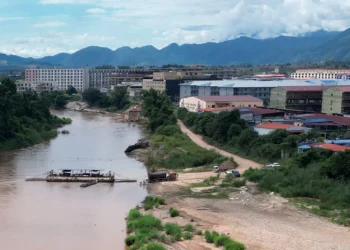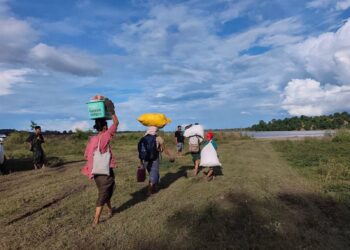By JOE FREEMAN
Painting their faces in the colours of the Ukrainian flag, holding up signs reading “Save Ukraine”, and incorporating these messages into courageous public demonstrations and social media posts: these scenes could be from the besieged Ukrainian cities of Mariupol, Irpin or Kharkiv.
But they happened thousands of miles away – in Myanmar.
Within days of Russia’s invasion, the international community rallied around the people of Ukraine in a powerful and lightning-fast display of solidarity. From ordinary people offering financial support by booking Airbnbs in Ukraine with no intention of using them, to governments quickly adopting tough sanctions against Russia, the crisis has shown how quickly we can unite to oppose violent acts of aggression.
But in Myanmar, where the military seized power in a coup more than one year ago, the expressions of support for the Ukrainian people are all the more moving because of the terrifying risks implicit in the very act of gathering – being shot by soldiers or police officers, or arbitrary arrest, torture and death in custody.
Myanmar protesters put their lives on the line every time they step onto the street. More than 1,600 people have been killed by the security forces since the February 2021 coup, according to the Assistance Association for Political Prisoners. A March 15 report from the United Nations High Commissioner for Human Rights called this brutal repression a “flagrant disregard for human life”.
Parallels abound between Russia and Myanmar, going beyond shared military tactics and domestic repression of protesters and the media to increasingly close military ties. Though the two situations are vastly different in context, scope and geopolitical implications, there is still more that can be done in Myanmar. The quick and robust reaction to the invasion of Ukraine shows the international community can take meaningful action – when it chooses to.
The foot-dragging that has characterised the world’s response to Myanmar’s political crisis, and the extreme human rights abuses the military has inflicted on the Myanmar people, are heartbreaking in comparison.
In a screenshot shared online in Myanmar shortly after the Russian invasion, a Ukrainian man is doing an interview with ABC news. Asked about being separated from his family as he prepared to defend the country, he says, “Everything will be okay.”
These words have been tattooed on the hearts of Myanmar’s anti-coup resistance since the death of 19-year-old protester Ma Kyal Sin. Also known as Angel, she was wearing a T-shirt with the same expression when she was shot in the head and killed during a protest in Myanmar’s second biggest city Mandalay on March 3, 2021, exactly one year before the airing of the ABC interview.
As Russia pounds Ukrainian cities with missiles, artillery, and rockets, killing civilians in indiscriminate attacks, Myanmar’s military is stepping up a campaign of collective punishment against any form of resistance, whether peaceful or not. Satellite imagery reviewed by Amnesty International showed homes razed in several parts of northwestern Sagaing Region, where internet blackouts are the norm and reports of human rights violations emerge almost daily, as the military attempts to crush the poorly armed People’s Defense Force, formed to resist the military coup.
Both countries have also followed the same playbook in suppressing inconvenient truths that challenge their disinformation and propaganda. Russia has banned the use of the word “assault” and “invasion” in media coverage, while Myanmar has instructed media not to use “coup” and other “incorrect words”. Authorities in both countries have been accused of searching mobile phones and arresting people for holding dissident content.
But the parallels go deeper than oppressive tactics – the Myanmar military’s arsenal includes Russian-supplied arms. According to a new report from the United Nations Special Rapporteur on the human rights situation in Myanmar, Russia has provided Yak-130 jet fighters, missiles, armoured personnel carriers and unmanned aerial surveillance to a military that has “repeatedly attacked civilians using these same types of arms”. Weapons transfers have continued since the coup, according to the report, even as the UN rights chief warns the Myanmar military has likely committed fresh war crimes and crimes against humanity during that time.
The Myanmar military has returned the favour. As international condemnation poured down on Russia following the invasion, a spokesperson for Myanmar’s military attempted to justify it. As most governments sought to isolate Russia, a Myanmar military delegation travelled to St Petersburg on March 16 for an exhibition where they viewed “technology and products” and “the demonstration of advanced counter-terrorism and security capabilities”. They also met representatives from Russia’s state-owned weapons exporter.
Russia is not alone in supplying the country with arms, but it has emerged as a key arms backer as Myanmar’s military conducts a reign of terror since the coup similar to the violence endured by ethnic minorities across the country for decades. In response to the crackdown, Amnesty International has repeatedly called for the United Nations Security Council to urgently adopt targeted sanctions and a global arms embargo to prevent the flow of weapons into the country. It must also refer the situation in the country to the International Criminal Court.
The harsh reality though is that many Myanmar people have lost faith in international mechanisms, as Chinese and Russian veto power stands in the way of much-needed action. Member states must find more creative ways to rally around Myanmar. Some have called to stop the sale of jet fuel that could hamper the ability of fighter planes to carry out their murderous bombing runs. Others have successfully urged large companies like Chevron and Total to withdraw from the country so as to deny the military resources that enable atrocities.
Any actions must carefully balance the needs to stop the attacks and promote accountability for human rights violations with avoiding knock-on effects on civilians in Myanmar, where millions face hunger, poverty and the ongoing ravages of the coronavirus pandemic.
If we can come together on Ukraine, we can come together on Myanmar – and any place where grave human rights abuses are taking place across the world.
Joe Freeman works on regional communications for Amnesty International. He was previously based in Myanmar as a journalist.
Credit – Frontier Myanmar
Response to Ukraine underscores foot-dragging on Myanmar crisis | Frontier Myanmar






